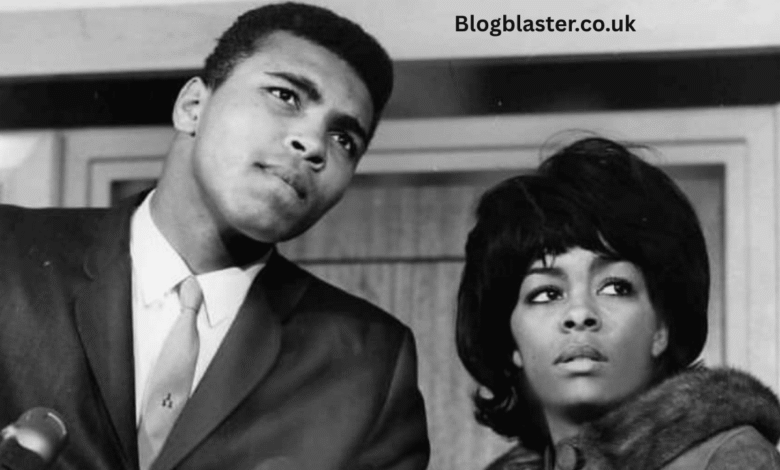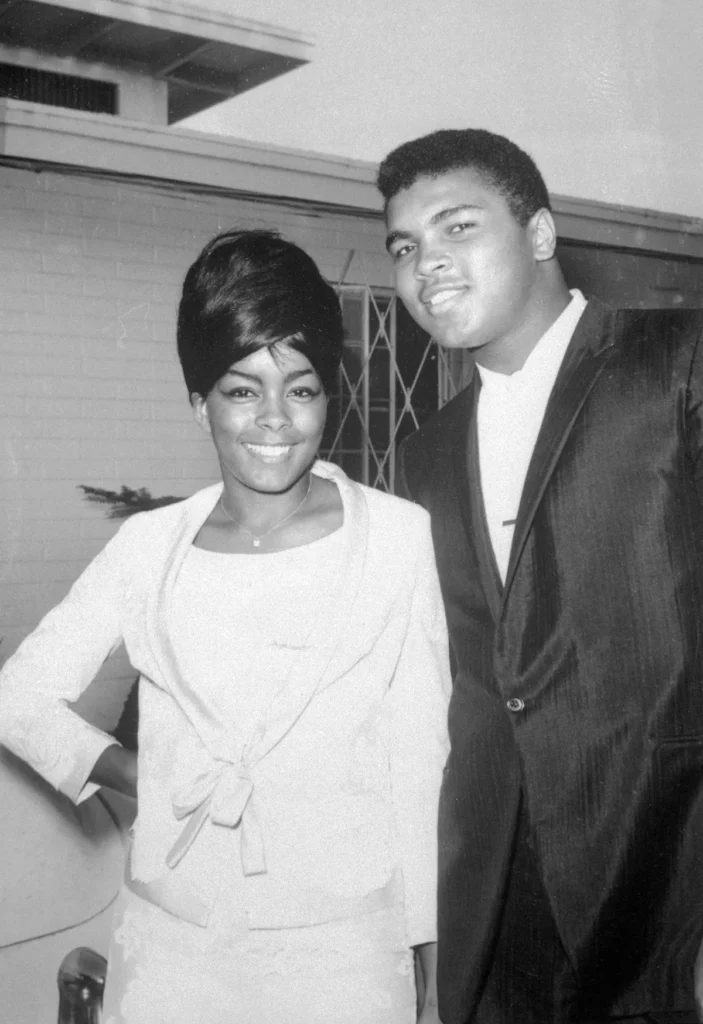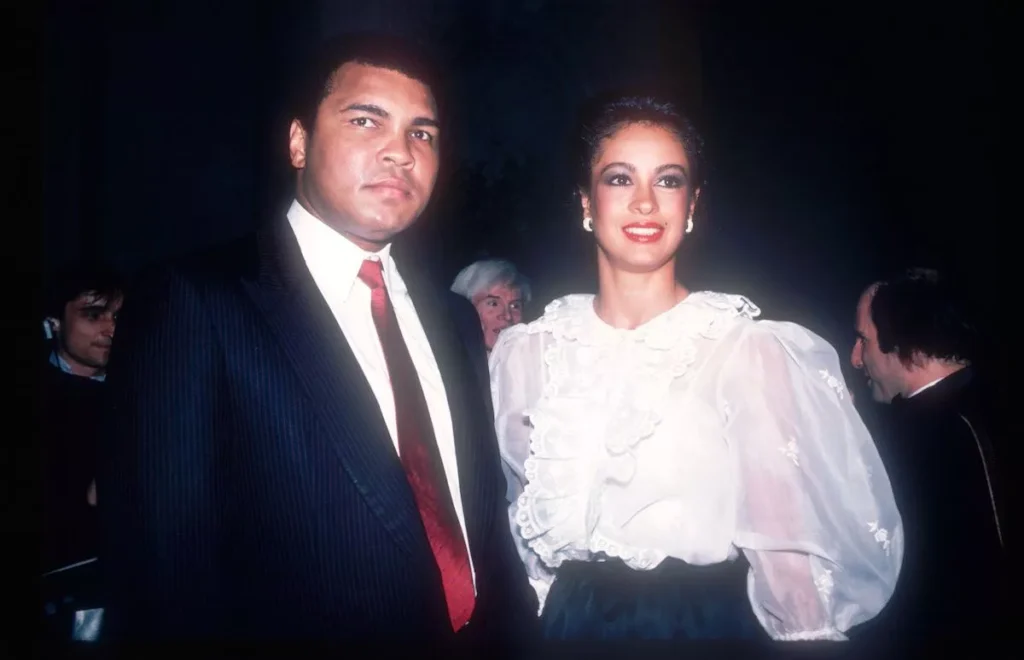Sonji Ro: The Untold Story of Muhammad Ali’s First Wife

Much of the focus falls on legendary boxer Muhammad Ali, his incredible achievements inside the ring and his activism outside of it. Yet, behind the early chapters of his life stands a woman who played a significant yet often overlooked role — Sonji Roi. As Muhammad Ali’s first wife, her brief but impactful marriage to the boxing icon remains an integral part of his personal history. This article explores Sonji Roi’s early life, her marriage to Ali, their challenges, and her enduring legacy.
Early Life and Background of Sonji Roi
Sonji Roi was born on November 23, 1945, in Gary, Indiana, USA. She grew up in a modest background and eventually moved to Chicago, Illinois, where she pursued a career as a model and cocktail waitress. Her charm, confidence, and striking beauty made her well-known in Chicago’s social circles during the early 1960s.
Before she met Muhammad Ali (then known as Cassius Clay), Roi was described by friends as independent, outspoken, and free-spirited — qualities that both attracted and clashed with the boxer’s growing religious and public image after his conversion to Islam. Her confidence and poise stood out, and her life changed dramatically when fate brought her face-to-face with one of the most famous athletes of all time.
How Sonji Roi Met Muhammad Ali

The meeting between Sonji Roi and Cassius Clay was as spontaneous as it was fateful. In July 1964, a friend of Ali’s introduced the two while she was working as a cocktail waitress in Chicago. Roi’s beauty and personality instantly smote Ali. Their connection was immediate — within just one month of meeting, the two were married.
Their wedding took place on August 14, 1964, in a small ceremony in Gary, Indiana. The media frenzy surrounding the marriage was immense, as Ali was already a world-famous boxer who had recently won the heavyweight title by defeating Sonny Liston earlier that same year. The marriage was widely covered in newspapers and magazines, presenting Roi as the new “Mrs Cassius Clay” — the glamorous wife of the new heavyweight champion.
Sonji Roi and Cassius Clay: A Marriage in the Spotlight

The marriage between Sonji Roi and Cassius Clay lasted less than two years, but during that short time, it drew intense public and media scrutiny. Ali had recently converted to Islam under the guidance of the Nation of Islam, changing his name from Cassius Clay to Muhammad Ali. This transformation created new expectations and pressures, not only for Ali but also for his wife.
Roi’s bold personality and modern fashion sense were said to clash with the stricter expectations placed on Muslim women by the Nation of Islam. Reports from that era suggested that religious leaders wanted her to dress more conservatively, covering her hair and wearing modest clothing — something she resisted. She later told reporters that she refused to change her personal style or beliefs for anyone, stating that she “was not born to wear veils.”
This cultural and religious conflict became a central point of tension in their relationship. Although they appeared happy at first, the gap between their personal beliefs and expectations widened with time. While Ali was embracing his faith and new public role, Roi was more secular and preferred living freely — dancing, socialising, and wearing stylish clothes.
The Divorce and Its Aftermath
The marriage between Sonji Roi and Muhammad Ali ended in divorce on January 10, 1966. They had no children together. In interviews after the split, Roi revealed that she felt suffocated by the expectations placed upon her by the Nation of Islam and that her independence was often misunderstood.
She once said, “He (Ali) wanted a wife who would be submissive, who would be quiet and obedient. But I wasn’t raised that way.” Her candidness made headlines at a time when women were often expected to conform to their husbands’ wishes. Many admirers later viewed Roi as a woman ahead of her time — someone who valued self-expression and freedom in an era that often limited women’s choices.
Although the marriage was short-lived, it marked a significant personal transition for both individuals. For Ali, it was part of his spiritual and personal transformation; for Roi, it was a brief moment in the global spotlight that would shape the rest of her life.
Life After Muhammad Ali
After her divorce, Sonji Roi mostly stepped away from public life. She occasionally appeared in interviews discussing her marriage to Ali, but preferred to live quietly in Chicago. There are few public records about her later years, as she chose privacy over publicity.
Some reports claim that Sonji Roi passed away in October 2005 in Chicago, although primary news sources do not widely verify these details. What is certain is that she is remembered by many as the woman who shared a pivotal chapter in Muhammad Ali’s journey from Cassius Clay to an international icon.
Even though her time in the limelight was brief, Roi’s story offers insight into the personal challenges faced by women married to famous figures. Her life after Ali reflected resilience and independence — qualities that defined her from the beginning.
Media Portrayal and Public Perception of Sonji Roi
In historical accounts and media portrayals, Sonji Roi often appears as a side note in Muhammad Ali’s biography. Yet, in reality, her story adds depth to the understanding of Ali’s life and choices. She was more than a “first wife”; she was a strong-willed woman navigating the expectations of fame, religion, and personal freedom.
Photographs of Sonji Roi with Ali from the 1960s — smiling at public events, attending press conferences, or posing for portraits — capture a young couple at the intersection of love and global fame. These images remain widely circulated in archives and serve as a reminder of her role in one of the most famous lives of the 20th century.
In later documentaries and articles about Muhammad Ali, Sonji Roi is sometimes described as “the wife who refused to conform.” This description captures both the essence of her personality and the reason why her marriage ultimately couldn’t endure the immense pressures of fame and ideology.
Sonji Roi’s Legacy
While Sonji Roi’s marriage to Muhammad Ali was short, her influence lingers in the narrative of his life. She represented a time of transformation — not just for Ali as a man but for the cultural and social dynamics of the 1960s. Her story resonates today as a symbol of independence, individuality, and the challenges women face when navigating traditional expectations within modern life.
Roi’s willingness to speak openly about her experiences at a time when public criticism of powerful men was rare makes her an early voice of female autonomy. She was unapologetically herself — confident, glamorous, and determined to live life on her own terms.
Although her name may not be as widely recognised as those associated with Muhammad Ali, Sonji Roi deserves acknowledgement as a woman who stood firm in her beliefs. Her courage to walk away from fame and conformity speaks volumes about her character.
Interesting Facts About Sonji Roi
- First wife of Muhammad Ali: Married him just one month after meeting in 1964.
- Independent spirit: Refused to change her dress and lifestyle to fit religious customs.
- Media icon of the 1960s: Frequently appeared in magazines and newspapers during her brief marriage.
- Short marriage: Lasted from 1964 to 1966.
- Later years: Lived privately in Chicago after her divorce.
- Cultural significance: Represents a forgotten chapter of 1960s American pop culture and the evolution of women’s independence.
Conclusion
The story of Sonji Roi is one of individuality, courage, and complexity. As Muhammad Ali’s first wife, she witnessed the rise of one of the most celebrated figures in sports history, yet her own story is equally worthy of remembrance. Her brief marriage to Ali was marked by love, conflict, and transformation — a poignant symbol of the tension between personal freedom and societal expectations.
You May Also Read: Jennifer Hageney: The Talented Floral Designer and Former Wife of Andrew Shue



